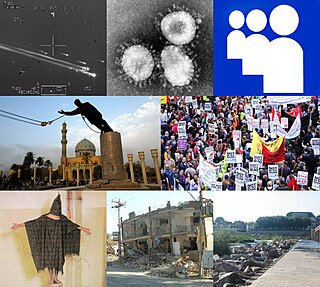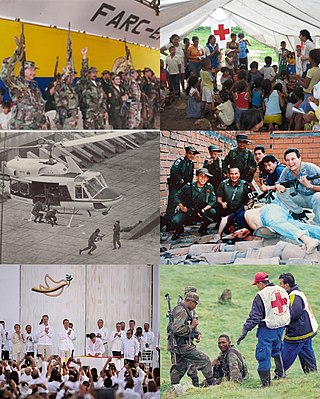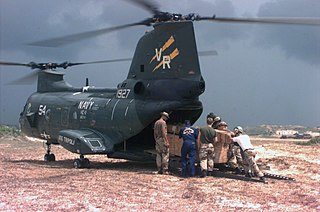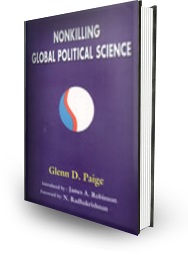 | |
| Author | Garry M. Leech |
|---|---|
Publication date | 2002 |
| Pages | 116 |
| ISBN | 0-9720384-0-X |
Killing Peace: Colombia's Conflict and the Failure of U.S. Intervention is a 2002 book by Garry M. Leech which documents the four-decade armed conflict in Colombia. [1] [2]
 | |
| Author | Garry M. Leech |
|---|---|
Publication date | 2002 |
| Pages | 116 |
| ISBN | 0-9720384-0-X |
Killing Peace: Colombia's Conflict and the Failure of U.S. Intervention is a 2002 book by Garry M. Leech which documents the four-decade armed conflict in Colombia. [1] [2]

A civil war is a war between organized groups within the same state . The aim of one side may be to take control of the country or a region, to achieve independence for a region, or to change government policies. The term is a calque of Latin bellum civile which was used to refer to the various civil wars of the Roman Republic in the 1st century BC.

The Revolutionary Armed Forces of Colombia – People's Army is a Marxist–Leninist guerrilla group involved in the continuing Colombian conflict starting in 1964. The FARC-EP was officially founded in 1966 from peasant self-defense groups formed from 1948 during the "Violencia" as a peasant force promoting a political line of agrarianism and anti-imperialism. They are known to employ a variety of military tactics, in addition to more unconventional methods, including terrorism.

2003 (MMIII) was a common year starting on Wednesday of the Gregorian calendar, the 2003rd year of the Common Era (CE) and Anno Domini (AD) designations, the 3rd year of the 3rd millennium and the 21st century, and the 4th year of the 2000s decade.

A failed state is a state that has lost its ability to fulfill fundamental security and development functions, lacking effective control over its territory and borders. Common characteristics of a failed state include a government incapable of tax collection, law enforcement, security assurance, territorial control, political or civil office staffing, and infrastructure maintenance. When this happens, widespread corruption and criminality, the intervention of state and non-state actors, the appearance of refugees and the involuntary movement of populations, sharp economic decline, and military intervention from both within and outside the state are much more likely to occur.

Plan Colombia was a United States foreign aid, military aid, and diplomatic initiative aimed at combating Colombian drug cartels and left-wing insurgent groups in Colombia. The plan was originally conceived in 1999 by the administrations of Colombian President Andrés Pastrana and U.S. President Bill Clinton, and signed into law in the United States in 2000.

Proponents of democratic peace theory argue that both electoral and republican forms of democracy are hesitant to engage in armed conflict with other identified democracies. Different advocates of this theory suggest that several factors are responsible for motivating peace between democratic states. Individual theorists maintain "monadic" forms of this theory ; "dyadic" forms of this theory ; and "systemic" forms of this theory.

The United Nations Operation in Somalia II was the second phase of the United Nations intervention in Somalia and took place from March 1993 until March 1995, following the outbreak of the Somali Civil War in 1991. UNOSOM II carried on from the transitory United States-controlled (UN-sanctioned) Unified Task Force (UNITAF), which had been preceded by UNOSOM I. Notably, UNOSOM II embarked on a nation-building mission, diverging from its predecessors. As delineated in UNSCR 814, the operation's objectives were to aid in relief provision and economic rehabilitation, foster political reconciliation, and re-establish political and civil administrations across Somalia.

The Inter-American Treaty of Reciprocal Assistance is an intergovernmental collective security agreement signed in 1947 in Rio de Janeiro among many countries of the Americas.

The Colombian conflict began on May 27, 1964, and is a low-intensity asymmetric war between the government of Colombia, far-right paramilitary groups and crime syndicates, and far-left guerrilla groups, fighting each other to increase their influence in Colombian territory. Some of the most important international contributors to the Colombian conflict include multinational corporations, the United States, Cuba, and the drug trafficking industry.

Interventionism, in international politics, is the interference of a state or group of states into the domestic affairs of another state for the purposes of coercing that state to do something or refrain from doing something. The intervention can be conducted through military force or economic coercion. A different term, economic interventionism, refers to government interventions into markets at home.
Right-wing paramilitary groups in Colombia are paramilitary groups acting in opposition to revolutionary Marxist–Leninist guerrilla forces and their allies among the civilian population. These right-wing paramilitary groups control a large majority of the illegal drug trade of cocaine and other substances. The Colombian National Centre for Historical Memory has estimated that between 1981 and 2012 paramilitary groups have caused 38.4% of the civilian deaths, while the Guerillas are responsible for 16.8%, 10.1% by the Colombian Security Forces and 27.7% by non-identified armed groups, although the chief prosecutor of the ICC would contradict these numbers.
The history of Communism in Colombia goes back as far as the 1920s and has its roots in the ideas of the Russian October Revolution. Today guerrilla groups, self-proclaimed communists, state that they want to seize state power in Colombia by violent means, and organizations such as the National Liberation Army (ELN) continue their four decades old war with the United States-backed Colombian government.

The Unified Task Force (UNITAF) was a United States-led, United Nations-sanctioned multinational force which operated in Somalia from 5 December 1992 until 4 May 1993. A United States initiative, UNITAF was charged with carrying out United Nations Security Council Resolution 794 to create a protected environment for conducting humanitarian operations in the southern half of the country.
Chapter VII of the United Nations Charter sets out the UN Security Council's powers to maintain peace. It allows the Council to "determine the existence of any threat to the peace, breach of the peace, or act of aggression" and to take military and nonmilitary action to "restore international peace and security".

La Violencia was a ten-year civil war in Colombia from 1948 to 1958, between the Colombian Conservative Party and the Colombian Liberal Party, fought mainly in the countryside.

Juan Manuel Santos Calderón is a Colombian politician who was the President of Colombia from 2010 to 2018. He was the sole recipient of the 2016 Nobel Peace Prize.
Glenn Durland Paige was an American political scientist. He was Professor Emeritus of political science at the University of Hawaiʻi and Chair of the Governing Council of the Center for Global Nonkilling. Paige is known for developing the concept of nonkilling, his studies on political leadership, and the study of international politics from the decision-making perspective with a case study of President Harry S. Truman's decision to involve the United States in the Korean War.

Nonkilling, popularised as a concept in the 2002 book Nonkilling Global Political Science, by Glenn D. Paige, refers to the absence of killing, threats to kill, and conditions conducive to killing in human society. Even though the use of the term in academia refers mostly to the killing of human beings, it is sometimes extended to include the killing of animals and other forms of life. This is also the case for the traditional use of the term "nonkilling" as part of Buddhist ethics, as expressed in the first precept of the Pancasila, and in similar terms throughout world spiritual traditions. Significantly, "nonkilling" was used in the "Charter for a World without Violence" approved by the 8th World Summit of Nobel Peace Laureates.

Nonkilling Global Political Science is a 2002 book written by political scientist Glenn D. Paige. In his book, Paige challenges the violence-accepting assumptions of the discipline of political science as a whole. Paige introduces the concept of nonkilling, which refers to the absence of killing, threats to kill, and conditions conducive to killing in human society.

Peace at Any Price: How the World Failed Kosovo is a 2006 book by Iain King and Whit Mason. It chronicles the history of Kosovo, focusing on the period from 1999 to 2005, when Kosovo was governed by and under the authority of the United Nations.